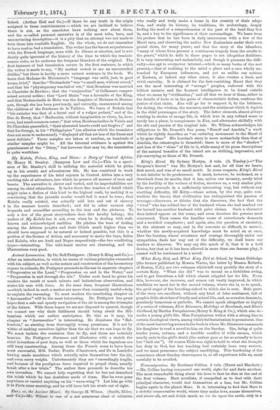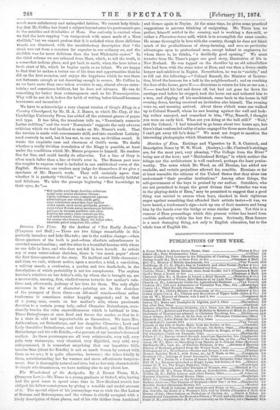Transmigration. By Mortimer Collins. 3 vols. (Hurst and Blackett.) —Mr.
Collins having conquered one world, sighs for and finds another. The most remarkable thing about his hero is that he dies at the end of the first volume. Most novelists, if compelled so to deal with their principal character, would feel themselves at a loss, but Mr. Collins begins again in the planet Mars. It is interesting to find that Mars is a strictly conservative world, where they make love, amuse themselves, and above all, eat and drink much as we do upon the earth, only in a
much more satisfactory and unimpeded fashion. We cannot help think- ing that Mr. Collins has found a subject beyond even his gastronomic pen in the eatables and drinkables of Mars. Our curiosity is excited when we find the hero supping "on ramp-steak with sauce made of a Mars shellfish," but we cannot profess that it is satisfied when these delicious *lands are dismissed, with the unsatisfactory description that "the steak was cut from a creature far superior to our ordinary ox, and the shellfish was far more delicious than the best Whitstable oyster." In the third volume we are released from Mars, which, to tell the truth, is a somewhat tedious place, and get back to earth, when the hero takes a fresh start of life, which he begins again as an infant. We are happy to find that he makes a better use of his time and opportunities than he did on the first occasion, and enjoys the happiness which he was there not fortunate enough or not deserving enough to secure. Mr. Collins is, as we have more than once taken occasion to say, almost always enter. tainin; and sometimes brilliant, but he does not itdvance. He can do something far better than extravagances such as his Transmigration. Why will he not do it before the habit of writing below himself becomes inveterate and incurable ?
We have to acknowledge a very elegant version of Gray's Elegy in a Country Churchyard, by Mr. H. A. J. Munro, to which Mr. Clay, of the Cambridge University Press, has added all the external graces of paper and type. It has &len, the translator tells us, "Nasonianis numeris Latine redditus," and the word Nasonianis' suggests the only adverse criticism which we feel inclined to make on Mr. Munro's work. That the version is made with consummate skill, and into excellent Latinity need scarcely bey said, but it has not, to our ears, an Ovidian sound. It wants the exquisite ease and clearness of Ovid's verse. We doubt whether a really Ovidian translation of the Elegy is possible, at least under the conditions which Mr. Munro proposes to himself. He renders line for line, and could hardly do otherwise. Yet a lino of Gray is often much fuller than a line of Ovid's ever is. The Roman poet uses the couplet to express what is included in one antithetical verse of the English. However, our readers may judge for themselves if we give a specimen of Mr. Munro's work. They will certainly agree that whether it is perfectly "Ovidian" or no, it is extraordinarily faithful and felicitous. We take the passage beginning "But knowledge to their eyes, &c ":— .
" Sed spoliis aevi large doctrine refertum nolnit ante ocnlos evoluisse librum ; algida sublimes testae compressit egestas adstrinxitque ono vivida cords gelu. espe renidentes praeclara lace lapillos antra marls, meat nocte profunda, gerunt: srepe rubor forum natus moriensque fefelelt, aersque in vacuum perditns exit odor. forsitan his andax rnris restare sod patio instant!, Graccns (wrestle ero, vel mettle sine honors Mare, vel Iulius alter, immunis patril sangainis Ills, cubet?'



































 Previous page
Previous page